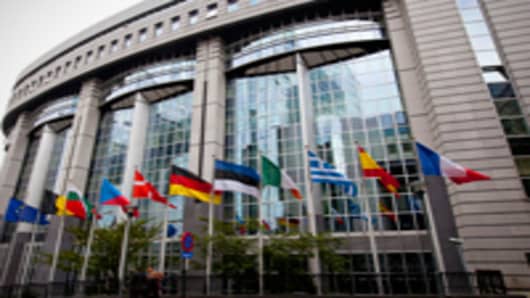The man who ran Germany when the euro began trading has an idea to save the euro zone: the creation of a "United States of Europe." Gerhard Schroeder, the social democrat who took Germany into the euro, told Der Spiegel on Sunday that the euro alone could not drive an economic bloc the size of the American economy.
"The current crisis makes it relentlessly clear that we cannot have a common currency zone without a common fiscal, economic and social policy. We will have to give up national sovereignty,” Schroeder said in the interview.
This would mean, according to the former German Chancellor, the creation of a government from the European Commission that would be overseen by the European Parliament.
Praising Angela Merkel and Nicolas Sarkozy for sending a strong signalthat they are on a path to fiscal union, Schroeder threw his support behind the idea of a joint euro bond.
His old political enemy Angela Merkel will not welcome Schroeder joining the ranks calling for a euro bond. The idea remains very unpopular in Germany where over the weekend Merkel and her ruling coalition government lost a regional election to Schroeder’s former party, the social democrats.
Over the weekend, Italian Economy Minister Giulio Tremonti used a press conference at the Ambrosetti meeting on Lake Como in Italy to repeat his call for a euro bond warning that without one "we will have critical problems."
In an interview with CNBC, the European Competition Commissioner Joaquin Almunia said fiscal union is needed. “This is one moment where we need greater integration. We need to learn from history to look forward with ambition,” he said.
Calling for fiscal union, Almunia also called for clear strategies and objectives following 10 years of the Lisbon Treaty.
Troubled Politics
The problem, as always with the euro zone, is that plans for further integration will crash into political and economic realities that have led us to the current state of affairs.
In Italy, Silvio Berlusconi’s government is under pressureto deliver on austerity measures worth 45 billion euros ($63.45 billion). Following a number of concessions to political pressure groups, the austerity measures are being questioned by the one man Italy needs to back the plan, Jean-Claude Trichet.
In return for ECB support for the Italian bond market, Berlusconi and his finance minister Giulio Tremonti signed up to a plan to cut the euro zone’s third-largest economy's budget deficit.
Just weeks later, Trichet is warning that it is “essential that the target that was announced to diminish the deficit will be fully confirmed and implemented."
The former boss of Unicredit, Alessandro Profumo, told an Italian newspaper over the weekend that Italy needs austerity measures worth 400 billion euros if Italy’s debt to gross domestic product ratio is to fall below 100 percent.
Or take Greece, where on Friday talks between the government and officials from the EU, IMF and ECB where suspended amid a battle over Athens commitment to its austerity program.
With the economy contracting, the Greek government is failing to meet its obligations under the terms of the first rescue package and the second rescue package remains in doubt following a lukewarm take-up of a debt swap plan by private investors and demands for collateral by Finland to lend any more cash to Athens.
Governments in Italy and Greece are struggling to sell austerity to their electorates and in Germany Angela Merkel is under immense pressure not to hand more tax money or Germany’s credit rating to spendthrift euro zone members to the south.
Over the weekend, Merkel’s center-right coalition lost heavily in a regional election and on Wednesday Germany’s top court will rule on whether handing over billions to the European Financial Stability Fund, the euro zone's bailout fund, is constitutional.
Creating a "United States of Europe" when Europe’s leaders are unable to agree on short-term measures aimed at shoring up confidence in the euro is a big ask for those actually in power.
It is far easier for former leaders and those working at the European Commission to tell those holding power how to get out of trouble when they don’t have to answer to voters themselves.



